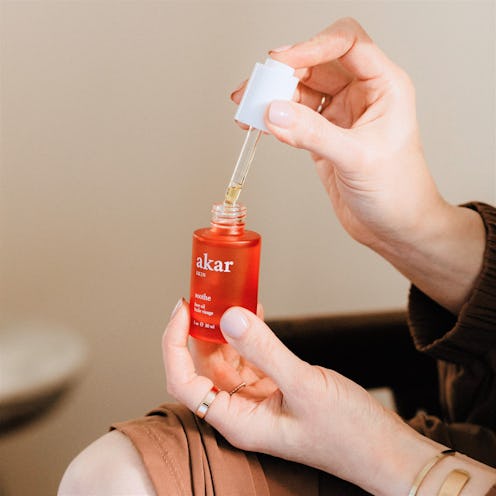(Beauty)
These Face Oils Are Super Hydrating and Derm-Approved For Winter

Talking about the weather gets a bad rap — who decided it was a a dull, small-talk topic of conversation? It literally affects everything; your health, your outfit choices, your skincare routine. Honestly, I want to talk about the weather more. Specifically, I want to talk about the best face oils for winter weather — because it’s cold outside, my skin is dry, and I’m in need of some dermatological guidance to get it back on track. Anyone else?
The below-freezing temps and whipping wind can be harsh on skin, but it doesn’t have to be that way — there are an abundance of oils to choose from to keep your face protected. “Face oils are the largest growing group of skincare products on the market right now,” Dr. Joshua Zeichner, a dermatologist at Zeichner Dermatology in New York City, tells The Zoe Report. “Some oils offer direct benefits to the skin themselves, while other oil-based products deliver traditional active ingredients to the skin; but just like other skincare products, there are oils on the market to suit every skin need.” And what your skin needs right now, most likely, is moisture.
“In winter, dryness is a common concern,” Dr. Sejal Shah of SmarterSkin Dermatology tells TZR; and dry skin is prone to irritation. To combat this, “I generally like oils that are hydrating but not very comedogenic,” she says. Her top picks include argan, borage seed, safflower, sea buckthorn, squalane, sweet almond, and camellia oils for their ability to moisturize without clogging pores.
While hydration is key, choosing the right winter face oil also depends on your unique skin type. “Argan and rose oils have anti-inflammatory benefits and are great for aging skin,” Dr. Zeichner says. “Tea tree or moringa seed oils are appropriate for people with acne-prone skin, while those with dry skin should look for hydrating avocado or sandalwood oil.” He also suggests marula or kiwi oils for combination skin, since they’re universal crowd-pleasers.
Even those who produce a lot of natural sebum can benefit from a face oil, since some oils serve to keep your pores’ production in check. “Choose oils that can hydrate while balancing the skin's oil production, such as kalahari melon oil and jojoba oil,” Dr. Shah says. And the skincare myth that states oils are too heavy for daytime use? You can forget about that completely.
Dr. Shah recommends incorporating an oil into your morning skincare routine to keep skin dewy throughout the day. “Generally, most people tend to like using faster-absorbing oils during the day as they feel ‘lighter,’” she says. “The fastest absorbed oils are those that contain at least 50 percent polyunsaturated fats, like grape seed oil, emu oil, wild rose oil, and hemp oil.” For nighttime, anything goes (as long as it jives with your skin type, of course). Simply layer on your oil of choice as the final step in your regimen, after your serum and moisturizer — not the other way around. Since oils tend to lock moisture into the pores, they’ll also lock out the active ingredients of anything applied afterwards.
“As with any traditional cream or serum, if you put too much on, it may leave the skin feeling greasy,” Dr. Zeichner says. While this probably isn’t a problem before bed, extra oil can interfere with your makeup during the day. “Gently blot the skin with a washcloth to remove excess product,” the dermatologist instructs — and keep your morning application limited to just a drop or two going forward.
Ahead, every derm-approved face oil you need to keep your skin safe until spring.